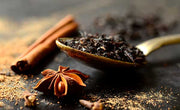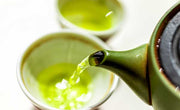Eight Yummy Tea and Honey Combinations

You've probably heard about those who enjoy honey in their tea. For some, it is such a tradition they couldn't imagine a cup of tea without it! Maybe this is you! If this isn't you, but you're curious to know which tea goes best with honey, you'll find some answers below.
What IS honey?
You've seen those industrious little guys. They buzz around your garden, acting all buzz-iness like as they dart in and out of your latest garden blooms. They really are doing something when they disappear inside the petals.
The bees are extracting the nectar, a sugary liquid, from the flowers with a long, tube-shaped tongue. After returning to the hive, they deposit the nectar, loaded with healthy plant compounds, into the honeycomb. Using their wings, the bees fan the honeycomb to remove excess water out of the honey. This process creates the thick syrup you enjoy.
What is raw honey?
Raw honey is honey that has come straight from the honeycomb. It is extracted, strained, and ready to enjoy.
"Regular" honey goes through several steps of processing, such as pasteurizing, and filtration which removes impurities and destroys the yeast. This processing provides a longer shelf life and creates visually clearer honey. But processing can also remove some beneficial nutrients and antioxidants. And there begins the debate on which honey is better (or better for you).
Is honey good for you?
Honey has been used for many years as a food as well as a medicine. The plant compounds in honey have been shown to lower blood pressure, improve cholesterol, and promote the healing of burns and wounds. Local honey has been shown to help with allergies native to your area.
Honey makes a great replacement for refined sugar. One tablespoon of honey contains 64 calories and 17 grams of sugar (fructose, glucose, maltose, and sucrose). Because these are not empty calories as you get with processed sugar, honey is a delicious, healthier alternative.
The color, taste, fragrance, and texture of honey vary depending on the particular flowers the bee was visiting. Many of these unique flavors can be lost during the processing of "regular" honey.
Tea and honey benefits
So how do tea and honey benefit your cup of tea (and you)?
- Honey adds sweetness to your tea without the empty calories of processed sugar
- Helps lower blood pressure and improve cholesterol
- Helps neutralize bacteria to promote the healing of wounds and burns
- Together, honey and tea neutralize the bacteria present in a sore throat and provide relief
- If your throat is irritated from coughing, the combination of tea and honey can help clear mucus, and soothe your throat.
And now for the yummy tea and honey combinations!
Black tea and honey
The robust flavors of many types of black tea go well with a bit of honey. Herb-flavored honey goes well with the spicy, jammy aroma of an Irish Breakfast tea. While the citrus flavors of the bergamot oil in Earl Grey Creme complement well with orange blossom honey.
Mint and honey tea
Depending on the type of honey you use, your mint tea will take on a unique aroma. Mint and honey tea are good for their antiseptic properties, making them useful for a nagging sore throat. Tupelo honey adds a delicate sweetness to white, green or soft herbal teas
Chamomile and honey tea
There's just something about settling in for the night with a cup of Chamomile and honey tea. The soothing effects are perfect for nighttime enjoyment, so keep the honey mild as well so it doesn't overpower the chamomile.
Cinnamon and honey tea
The sweet and spicy flavor of cinnamon tea is delicious with a drizzle of honey. Both honey and cinnamon have anti-inflammatory properties, help combat allergies, boost your immune system, and help cure occasional constipation. There are some that say adding one teaspoon of honey to your cinnamon tea can help with weight loss.
Green tea and honey
Floral honey is well-suited for the more mild, grassy flavors of green tea. Clover, Lavender, or Tupelo honey will enhance the unique flavor of your green tea.
Ginger and honey tea
These two powerhouses go naturally together in tea as a natural remedy. The combination of ginger and honey tea may help reduce mucus buildup, open your sinuses and reduce inflammation of the airway.
Turmeric and honey tea
Both turmeric and honey have amazing health benefits, so take it to the next level by enjoying them together! Just like ginger and honey tea, adding honey to turmeric tea may help treat coughs, colds, infections, and inflammation.
Honey and lemon tea
As another perfect cold remedy, honey and lemon tea is just plain soothing and tasty. Lemons full of vitamin C help cut through congestion and the honey softens the tart juice flavor and soothes the throat.
Can I enjoy my tea with milk and honey?
There are a lot of "rules" out there of what you should or should not put in your tea. There's no right answer when asking an Earl Grey tea lover how to make the best cup of tea. Some will say don't add a thing, while others insist earl grey must be enjoyed with lemon. Others wouldn't consider it without adding milk.
There are certain teas that just lend themselves better to adding milk, such as black teas. But the bottom line is: it's your cup of tea! Make your own decision and enjoy!
Remember, when you add honey to your tea, be sure the tea has been allowed to cool for about 10 minutes. The health benefits of honey are depleted when exposed to high heat.






Good question wawawawa – For chamomile tea, honey is a classic pairing because it complements the naturally sweet, floral notes without overpowering them.
Start with ½ teaspoon per 8 oz cup, taste, and increase to 1 teaspoon if you want it sweeter.
Use mild, light-colored honey (like clover, acacia, or orange blossom) so you don’t mask the gentle floral flavor of the chamomile.
Add the honey when the tea is warm but not boiling hot to preserve its delicate aroma and beneficial enzymes.
how much honey should you add to tea? like 1 to 2 tea spoons? im interested in trying with chamomile but im interested in knowing whats the high and low ends to adding honey to tea in general!
Hi Anna, Yes! Tupelo honey would be perfect for adding some sweetness to herbal tea. Tupelo honey has a mild floral and fruity flavor so it goes well with white, green, or lighter herbal teas adding a delicious and distinctive sweetness.
I’ve been trying to maintain a healthy living lately, so I’ve gotten interested in drinking tea during my meals. I appreciate your recommendation regarding adding tupelo honey to herbal teas if you want a delicate sweetness to your drink. I’m hoping to find tupelo honey when I go shopping this weekend, so I can enjoy it during my tea times. https://registerfamilyfarm.com/collections/tupelo-honey